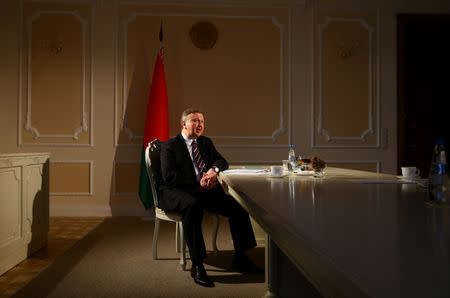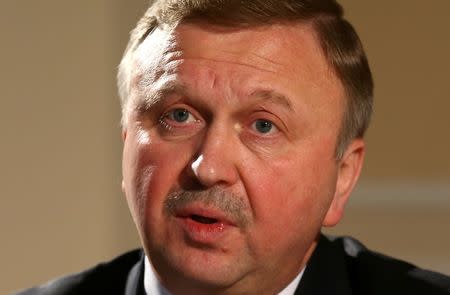Belarus PM wants same gas price as Russian regions
By Andrei Makhovsky and Katya Golubkova MINSK (Reuters) - Belarus wants Moscow to give it the same price for Russian gas as Russian regions bordering the ex-Soviet country pay, Belarusian Prime Minister Andrei Kobyakov told Reuters in an interview. The two countries, traditionally allies, have been at odds since the start of the year over how much Minsk should pay Russia's Gazprom for gas supplies following a slump in global energy prices. Minsk, which says a gas price set by Gazprom of $132 per 1,000 cubic metres is too high, has been paying less on delivery since the start of the year and Gazprom says it is owed $270 million (218 million pounds) for the first six months of 2016 alone. Belarus, a major transit route for Russian gas to Europe, has previously said a price of $73 would be reasonable. Kobyakov, in the interview given on Monday, said he thought a "fair price" would be the same as that paid by Russian regions adjacent to his country. "If in the regions that border Belarus the gas price is more than two times cheaper, it is obvious that the competitiveness of the goods which Belarus is producing will be quite a bit worse than in Russia," Kobyakov said. "So we are saying: 'We don't mind if you raise prices to levels matching Belarus ... But if you can't raise prices at home, then adjust the price for Belarus to yours." Since July, in a move interpreted as an attempt by Russia to put pressure on Minsk, Russian oil pipeline monopoly Transneft has been pumping about 40 percent less oil to Belarus than in the second quarter of this year. Belarus has been trying to secure oil supplies from other sources and received test shipments from Azerbaijan. Kobyakov said Azeri oil, which arrived by sea via the Ukrainian Black Sea port of Odessa and was delivered by land to landlocked Belarus, was one of the most "thought through" options but not the only one. Kobyakov also did not rule out a new potash alliance with Russia's Uralkali. Such a tie-up was "possible," he said, but Belarus would approach any potential deal "very carefully". "We don't want the situation that happened in 2013 to repeat itself," he said. In 2013, Uralkali left a trading joint venture with the Belarusian Potash Company, triggering a fall in global prices of the crop nutrient and hitting Minsk's revenues. ECONOMIC PROSPECTS Belarus is in talks with the International Monetary Fund about a $3.5 billion loan package, which Kobyakov said Minsk aimed to use to replenish its gold and foreign exchange reserves. "In general, we are aiming for the (IMF) programme to be launched in the first half of 2017. But not at any price," Kobyakov said. "Talk is rather about timing: we are for smoother changes, while our partners are for more rapid dynamics." He added that talks with the IMF were "constructive", yet two difficult groups of questions focused on utilities' tariffs and improvement in the state-controlled part of the economy. Kobyakov also said Belarus was looking at raising $800 million via a Eurobond next year, aiming for a seven-year maturity. He forecast Belarus's economy to grow by around 1.7 percent next year, with inflation falling to 9 percent from 11 percent expected in 2016 and gold and forex reserves rising to $5.5 billion. As part of attempts to diversify its economy, traditionally closely tied with Russia, Kobyakov said Minsk aimed for a strategic investor from among Western banks to be present in the Belarus banking system. Belarus is preparing to sell a stake of up to 25 percent in Belarusbank, which accounts for more than 40 percent of banking assets in the country, with a decision on the investor seen within two years. "Certain bidders have emerged, including a well-known Hungarian bank. But this does not mean yet that we have finally decided. The work is at its very beginning," Kobyakov said. (Reporting by Andrei Makhovsky and Katya Golubkova; Editing by Dale Hudson)

 Yahoo News
Yahoo News 


